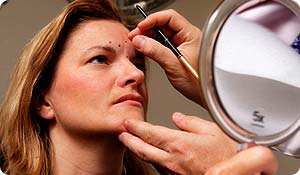
BOTOX Cosmetic (Botulinum Toxin Type A) is a neurotoxin administered through a series of small injections to reduce reduces forehead and frown lines between the eyebrows. It works by temporarily paralyzing the muscles and is relatively quick and painless. It's also the most popular physician-administered non-surgical cosmetic procedure in the United States. But you should make sure you're working with the right professional to ensure best results. BOTOX Cosmetic and the American Society for Aesthetic Plastic Surgery recommend you ask your doctor the following questions before you get started:
How often do you work with BOTOX Cosmetic? Will you yourself be administering the injections? What are your certifications?
For the best results, make sure a licensed and experienced doctor will be handling your procedure. Members of the BOTOX Cosmetic Physicians' Network are experienced with facial aesthetics have detailed knowledge of facial anatomy, and a lot of experience injecting BOTOX Cosmetic.
Am I a good candidate?
Be sure your doctor knows everything about your medical condition, including any prescription or over-the-counter medication and supplements you're taking; if you're pregnant, trying to conceive, or breastfeeding; and any known allergies. People with neuromuscular disorders run a higher risk of side-effects.
What kind of results can I expect?
You normally see results within a few days, and these continue to improve. The results typically last for up to 4 months. Ask your doctor to show you before/after photos and discuss what you should realistically expect.
What should I expect on the day of the procedure?
The procedure usually takes about 10 minutes and doesn't require any anesthesia, though some doctors may numb your forehead with a cold pack or cream, before injecting it several times with the BOTOX. Knowing your doctor's process will make you more comfortable.
What are the side-effects and how often have you encountered them?
The makers state the most common side effects include temporary eyelid droop, nausea, along with some pain, inflammation, swelling, or minor bleeding and bruising at the injection site. Ask your doctor what effects her patients have experienced.
How do I prepare for the procedure?
Most doctors will recommend that you avoid alcohol and any anti-inflammatory drugs for a week before the procedure. Also, if any infection develops in the area that will be injected, you should postpone the procedure until it clears up since this can increase your susceptibility to side effects.
What are the warning signs of something going wrong? What should I do if I have a problem?
While the chances of serious reactions are minimal, BOTOX is a toxin and the risk is there. Be sure you understand when - and how - you should seek medical attention if needed.
How many units will I get? Do you charge by the unit or injection? What will you do if I'm not satisfied with the results?
BOTOX is not an inexpensive. You should feel comfortable discussing what you're paying for with your doctor. While your doctor will make the best decision regarding the units and injection pattern that's best for you, he should be forthright about what he's doing.
Sources:
The American Society for Aesthetic Plastic Surgery
http://www.surgery.org/public/procedures/cosmetic_procedures_snapshot/injectablefillers#eleven
BOTOX Cosmetic Official Site
http://www.botoxcosmetic.com/





